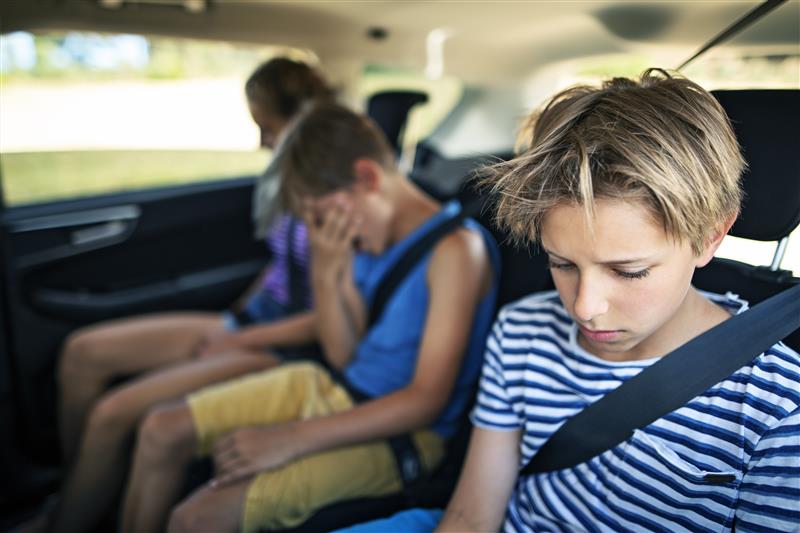Across the UK, family travel plans are being foiled by a single fear: car sickness.
According to research by Churchill Motor Insurance, over a third of UK drivers who have children say their kids have experienced car sickness.
And, as anyone who has ever been in the car with a sick child will know, it’s just as unpleasant for you as it is for them.
In fact, many of today’s parents are so keen to avoid moments of car sickness that they’re simply saying ‘no’ to family day trips and fun days out.
Two in five (41 %) UK drivers dread long car journeys with their little ones. While over a quarter (27%) of families affected say they actively avoid car travel altogether, and 17% only take essential trips with their children.
Symptoms of car sickness
Of course, car sickness isn’t just for the kids. It can also affect adults, with one in eight (13%) of those surveyed saying they also suffer from it.
Common symptoms include nausea and vomiting, dizziness, headaches, sweating, and excessive saliva production, none of which is particularly pleasant during a long journey.
The research also found that car sickness can be made worse by some activities we often encourage our children to do to pass the time and stave off boredom when travelling.
Reading in the car (48%), using a phone (39%) and watching a screen (39%) were listed as the top three things that can make car sickness worse. Could it be time to banish comics and consoles from the back seat?
Why do we get car sick?
We spoke to Dr. Qadeer Arshad, a neuroscientist and Director of Research for the inAmind Lab at the University of Leicester, to ask about his research into what causes car sickness.
“As a neuroscientist, I’ve seen how disruptive car sickness can be for children and adults. Our research has shown that car sickness stems from a disconnect between the sensory signals sent to the brain, particularly the balance system. This mismatch is often triggered by certain activities, such as reading a book or watching a screen while in motion.
“By understanding these triggers, families can take practical steps, such as opening a window for fresh air or avoiding screens, to help mitigate symptoms and make journeys more comfortable for everyone.”
The impact of car sickness on daily life
Nicholas Mantel, Head of Churchill Motor Insurance, agrees that car sickness can be a problem.
“The challenges that come with children who suffer from car sickness are widespread and often overlooked. With a significant proportion of children and even adults affected, car sickness can have a serious impact on everyday life. Parents are finding themselves dreading long trips and non-essential travel, limiting their mobility and day-to-day experiences.
“It is important to raise awareness on this affliction and mitigate it through practical methods, especially as it can be highly distracting for parents when driving. Parents should explore, where possible, some preventative methods to help avoid their children suffering from car sickness.
“Consider always driving with another passenger in the back of the car, avoiding activities that can trigger car sickness in an individual and keeping hydrated.”
What to do if car sickness occurs while driving
The most important thing is always to drive safely. If you know your child or passenger is prone to car sickness, you may want to consider scheduling regular stops to break up the journey.
You can also be prepared for episodes of sickness by having a ‘car sick kit’ ready to go. This could include a bowl or a disposable bag, a water bottle and tissues or wet wipes.
If you or your passenger feels nauseous, find a safe place to stop, such as a service station or layby, and get some fresh air until the feeling passes.
Ways to combat car sickness
Several options are available for those keen to combat car sickness – from preventative measures such as over-the-counter travel tablets or motion sickness wristbands, to being prepared with a ‘car sick kit’ (see above) kept in easy reach of poorly passengers.
The return of traditional games such as I-Spy could also help, as they keep youngsters entertained and distracted from moments of nausea while avoiding some of the most common causes of car sickness, such as looking at screens or reading.
Among those surveyed, driving with a window open to let in plenty of fresh air was also listed as a popular prevention tip (33%), alongside drinking lots of water (26%), eating sweets (20%) and listening to music (19%).
Dr Qadeer Arshad’s top tips
Dr Qadeer has five tips that offer simple yet effective strategies for a smoother and more comfortable journey.
1) Open the window and look outside or at the horizon
2) Avoid using your phone and avoid reading while the car is in motion
3) Manage anxiety effecively
4) Try to sit passengers in the middle of the car where there's less motion
5) Getting used to car sickness can reduce the severity of future episodes
If you're preparing for a family road trip, read our blog on ways to keep the kids entertained on long car journeys.




